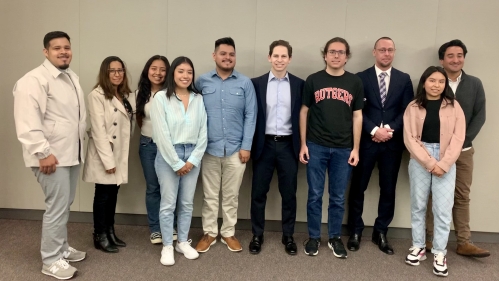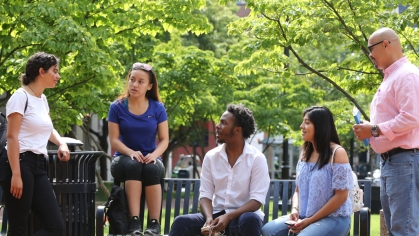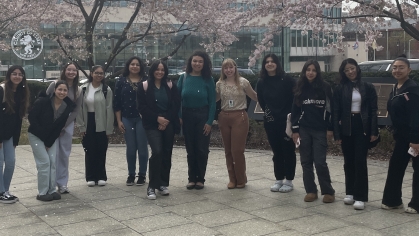As the Mexican government prepares to open its first consulate in New Jersey--where the number of Mexican residents is growing--leaders sat down with Rutgers-Newark students, staff and faculty to forge a relationship that could include research efforts.
Representatives from the consulate office, slated to open in New Brunswick in June, visited Rutgers-Newark in part because it is a Hispanic Serving Institution, meaning 25 percent or more of its students are Latinx.
“We want to keep students engaged with Mexico,’’ said Jaime Vazques Bracho, Director General of Consular Services at Mexico’s Secretariat of Foreign Affairs.
Students at the meeting included Mexican members of RU Dreamers, who wanted to learn more about the consulate’s role and advocate for students and their family members in New Jersey.
Of the nation’s more than 740,000 DACA recipients, 618,000 are from Mexico, and the New Jersey consulate wants to establish bonds with them. “We want to be closer to the Dreamers,’’ Bracho said.
During his presentation, Bracho delved into the history of the consulate’s nearly 200-year presence in the U.S--where there are 38.5 million Mexican nationals–and described the types of services offered, beyond issuing passports and other documents.
The consulate helps provide health services and legal aid for nationals. It supports victims of domestic violence, eases immigration efforts, provides services to negotiate deportation cases and fight exploitive labor practice, often working with state and local advocacy groups. Because the Mexican government vehemently opposes the death penalty, it works to defend nationals who are facing capitol punishment in the U.S.
Another role is to facilitate voting among Mexican nationals who want to cast ballots in their homeland.
In 2019, the consulate began issuing documentation for same sex marriages and last year, it began offering birth certificates to Mexican nationals who are transgender, allowing them to choose a designation that corresponds with their gender identity. The consulate issued more than 1,000 since 2022.
“Think of a trans person who has been living as a woman for 20 years but can’t rent a place, get a job or travel without the proper documentation,’’ said Bracho. “It’s super important in protecting them.”
The consulate offers support for small business owners and internships for college students. Another important role is providing cultural immersion programs for young Mexican nationals, who are often unable to visit Mexico and can feel a sense of disconnection from their cultural heritage.
“How can we get Mexicans here to care about where their parents and grandparents come from?” asked Jacob Amaro, a journalism major.
Rutgers Business School professor Arturo E. Osorio, who is from Mexico and helped coordinate the event last week, said he often hears Mexican students living in the U.S. say that they feel neither fully Mexican or American but occupy some limbo in between. Learning more about Mexico and Mexican culture, and its government’s relationship with the U.S., can help.
“It’s important for their identity,’’ said Osorio. “This is a validation. And it’s important for them to know what the consulate can and can’t do.”
Isela E. Coyotecatl Ricoy, head of RU Dreamers, suggested that one thing the consulate could do to help Mexicans in New Jersey is lower the price of obtaining a passport, which can be a financial drain, especially for large families.
Bracho explained that passport income supports consulate operations directly, so any decrease in revenue would have an impact on consular operations. And the agency’s current policy is to expand and modernizes services.
After the meeting, Coyotecatl Ricoy said she appreciated the dialogue with Bracho and other officials and the chance to learn more about the consulate. “They were very insightful,’’ she said. But she hoped that when the New Jersey consulate is established, officials will listen to Dreamers and incorporate their perspectives.
In the consulate officials’ meeting with faculty and staff members, participants suggested collaborating on research into gender identity, entrepreneurship and the efficacy of services offered by the consulate. Bracho said the agency would be eager to work with RU-N researchers.
In his presentation to students and faculty, Bracho talked about the enormity of the Mexican diaspora, noting that there are more Mexicans than people from any other nationality living in the U.S., often leaving their homeland because of economic conditions and violence.
It prompted him to revisit the meaning of the word “diaspora,’’ he said.
“It’s a community that shares a longing for their home country,’’ he explained. “We must not allow ourselves to forget sentiments and feelings when creating policy.’’



